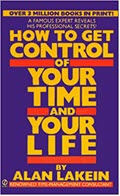Every few years, I re-read How to Get Control of Your Time and Your Life by Alan Lakein. This little book helps me answer a crucial question: “What is the best use of my time right now?” Figuring out the answer can be difficult, particularly when I undertake new projects. It takes fresh thinking to challenge old routines and sort out new issues. Alan Lakein seems to know just what I need to think about to bring my priorities into focus.
For example, recently I have been working on marketing my business, a new endeavor for me. I found that I can generate ideas for how to get customers at about ten times the rate I can implement them. I became overwhelmed and confused regarding the best use of my time on this project.
I knew that the general solution to this problem is planning. So, I dedicated an entire Saturday to planning my marketing campaign. By the end of the day, I was much clearer on many specific issues, but I felt I needed two more days on it, time I couldn’t afford. I was nowhere near having an actual plan. Clearly I was over-planning—which was not the best use of my time.
I was temporarily stymied. I knew that I had to plan to cut through my confusion, but planning was now part of the problem of overload. And then something Alan Lakein said flitted through my mind:
“Planning is really decision-making.”
I recalled he had followed this with some advice:
“Take a piece of paper and head it ‘I have decided.’ You are now ready for five minutes of Decision Time.”
I tried it. I pulled out a sheet of paper and wrote, “I have decided” at the top, and started writing down decisions about what to do. In 15 minutes I had a plan—not a future projection of all possible contingencies, or a multi-year task sequence—but a plan for the next few weeks, which was exactly what I needed.
Lakein had done it again. He gave me a simple, doable process that helped me focus on the essentials.
Ironically, this particular piece of advice had sounded to me like an oversimplified platitude. Now that I’ve tried it, I see that it isn’t, and I understand why it is so effective. In my planning, I had focused on all the possibilities open to me. But what I needed to know was, which ones would I make happen? I needed to make that choice to reduce innumerable possibilities into doable activities. “Planning is really decision-making.”
This incident is typical of my experience with this book. The advice is simple and easy to follow. It works extremely well, sometimes to my great surprise. When I reflect back on it, I can see why it was so effective.
Here are some of the other topics on which he has simple, surprisingly profound advice:
- Lakein offers a 15-minute exercise for determining one’s lifetime goals. (15 minutes!) It is so quick, because he helps you to determine your existing goals, not to work out some theoretical ideal.
- He presents an entire chapter on “Tasks Better Left Undone.” It’s practical advice for how to look fresh at an old task (one you assumed you “should” do) and see its true value to you.
- He explains every trick in the procrastinator’s book and how to get around each one. But he never lets you forget that “the goal, as ever, is to select your A-1 [top-priority task] and do it now.”
I could wish that Lakein spent more time drawing principles and integrating his advice into a system, but that would be ungrateful. What Alan Lakein offers is a broad array of advice that is true, clear, and easy to apply. It is advice on a subject that is important to everyone: figuring out what is the best use of your time.
Notes:
1) My thanks to Dr. Ellen Kenner, host of “The Rational Basis of Happiness,” for recommending this book to me some 10 years ago. Her website is www.drkenner.com.
2) You may wonder how this compares to the another book I recommended, David Allen’s book. They complement one another. Alan Lakein’s book will help you decide what to do with your time, including how to reduce your commitments to a manageable load. David Allen’s will tell you how to keep track of those commitments in such a way that your mind is left free to think on your highest-priority task.
Book Information: Alan Lakein, How to Get Control of Your Time and Your Life, Signet, 1989.









0 Comments